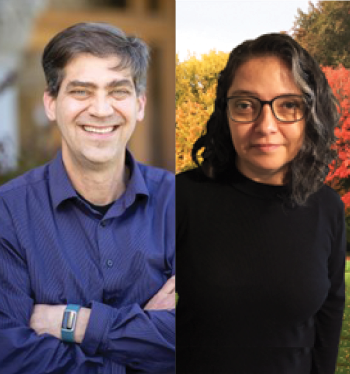Cory Buxton, Professor of Science Education, and Diana Crespo Camacho, 2022 CADRE Fellow & Ph.D. candidate, Oregon State University
 In this blog post, we briefly reflect on how family engagement in STEM learning has evolved as a research topic from the start of the NGSS era to the present day.
In this blog post, we briefly reflect on how family engagement in STEM learning has evolved as a research topic from the start of the NGSS era to the present day.
Ask nearly any teacher or school administrator, and they will tell you that family engagement is important to the success of their school. Ask them about family engagement in STEM subjects specifically, and you are likely to hear examples of how STEM fairs and events are some of the school's most engaging and well attended events. Press a bit more, however, on the specific family engagement goals, the specific activities for meeting those goals, and the alignment between those activities and goals, and you will often encounter a good deal of uncertainty. We believe that the reason for this uncertainty is, at least in part, that while family STEM engagement activities are common, their systematic study and dissemination of promising practices are rare.
In 2013, one of us was asked to write a handbook chapter with a colleague (Buxton & Lee, 2014) to synthesize the current research on multilingual learners in science education and to edit the section of that handbook (Lederman & Abell, 2014) addressing diversity and equity in science education. As we worked to include the topic of family science engagement in the section, we found that there was very little we could say based on published studies. We pointed to this topic as one that would benefit from additional research. Ten years later, in 2023, we were asked to play the same role for the new edition of the handbook (Lederman, Lederman, & Zeidler, 2023). Again, we were hardly able to include the topic of family science engagement in the handbook, because while we did find more published research than a decade earlier, the work remained largely absent from the high visibility journals we limited ourselves to in that review.
From the research that does exist, there is good reason to believe that engagement in meaningful and equitable family STEM learning experiences can support students’ positive STEM attitudes, interests, and identity. We need to conduct, disseminate, and promote research that can better guide educators toward more strategic family engagement models. This month’s CADRE Spotlight on family engagement is a positive step in that direction. Recent sessions at major research conferences also point to growing attention to research on this topic.
At the NARST conference in March, our Supporting Students' Language, Knowledge, and Culture Through Science (NSF #2010633) project participated in a session titled Cultivating science identities: Recognizing family contributions in nurturing curiosity and navigating transitions. Three research teams engaged in lively discussion around how, specifically, enhancing family science talk can increase students’ positive identities as science learners as they come to communicate more effectively about science in their lives. In particular, the discussion focused on students and families from groups traditionally marginalized in science and the need for family engagement to continue as students transition from elementary to secondary school.
At the American Educational Research Association (AERA) annual meeting in April, we participated in a session focused on promoting STE(A)M through family, school, and community partnerships. The four projects compared models of family engagement that highlighted: STE(A)M workshops for families in the school setting; the exploration of STEM concepts by early learning practitioners and Latine parents; the development of tools to support practice-based coaching for family engagement around preschool math learning; and the comparison of partnership models used in school based, after school, and community based programs in terms of how they promoted equitable learning experiences for all participants. Together, these projects reinforce the conclusion that new models of collaboration among families, students, teachers, and community members are needed to reach our shared goal of broadening participation in STEM fields.
Finally, we wish to note that there are professional organizations and conferences focused on research around family engagement, where STEM education researchers can and should make greater efforts to disseminate our work. In alternating years, the International Network of Scholars (INET) organizes a one-day meeting in coordination with AERA to share research and program development about school, family, and community partnerships. This year 44 researchers from around the world, including one of us, presented their work, but ours was one of few papers focused on promoting STE(A)M (Crespo Camacho, 2024). Similarly, the European Research Network About Parents in Education (ERNAPE) conducts its international conference in alternate years. Our team was one of the few focused on family STEM engagement at the last meeting in the Netherlands. We look forward to being joined by others in 2025 in Verona, Italy, and we very much hope that when the 4th Edition of the Handbook of Research on Science Education comes out in another decade, that the topic of family STEM engagement will be sufficiently represented in the literature so as to warrant its own chapter.
References
Buxton, C. & Lee, O. (2014). English language learners in science education. In N. Lederman & S. Abell (Eds.). Handbook of Research on Science Education, Vol. 2. Routledge, 204-222.
Crespo Camacho, D. (April 2024) Paseos are a way of enhancing Latina/o/x students' learning in Outdoor School. Paper presented at the 2024 International Network of Scholars (INET) meeting, Philadelphia, PA, USA.
Lederman, N. G., & Abell, S. K. (Eds.). (2014). Handbook of research on science education (Vol. 2). New York, NY: Routledge.
Lederman, N. G., Zeidler, D. L., & Lederman, J. J. (Eds.). (2023). Handbook of research on science education (Vol. 3). New York, NY: Routledge. https://doi.org/10.4324/9780367855758